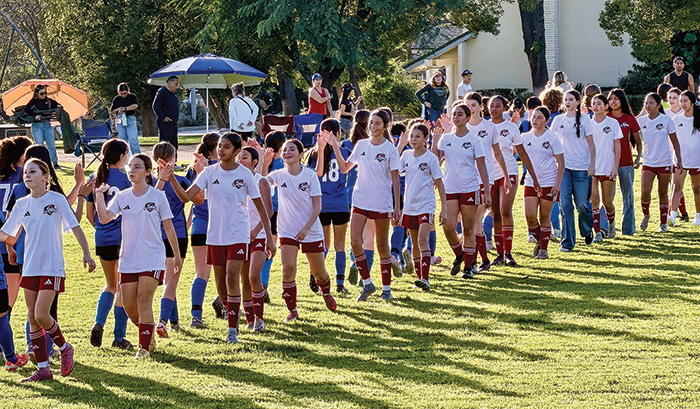Internet educator urges teens to think before they post
Local students were urged to take responsibility for their virtual presence, online safety and digital actions at an assembly held last Friday at El Roble Intermediate School.
Educational speaker Josh Gunderson took to the mic in the Panther gym, using hard facts and hu mor as he gave the kids tips on navigating the information age. His appearance was sponsored by the Claremont Educational Foundation.
mor as he gave the kids tips on navigating the information age. His appearance was sponsored by the Claremont Educational Foundation.
Mr. Gunderson’s first order of business was to let his audience know he isn’t trying to get them to unplug. He values social media himself—uses it all the time—and says it’s unrealistic to ask kids to resist the lure of 24/7 digital connection.
At the start of his presentation, he asked how many in the audience had used their cell phones to send a text message in the previous five minutes. A dozen hands went up.
“Busted!” he exclaimed, adding, “It’s totally fine if you’re texting about me: ‘This guy is awesome. He looks like a Jonas Brother.’”
He does, however, feel it’s important for kids to know the stakes are higher than they think when it comes to what they post. He went on to share a number of stories about young people whose lives were damaged by thoughtless digital behavior.
He shared a 2009 incident where some Pennsylvania teens learned about the consequences of “sexting” the hard way. Three high school girls sent “scandalous,” i.e. nude or semi-nude, photographs to four male students. The photos were discovered when a teacher confiscated one of the boys’ cell phones.
The girls were charged with manufacturing child pornography, while the boys were slapped with charges of possessing child pornography. All of the students, ages 14 and 15, had to register as sex offenders. It’s a title that will follow them throughout their lives as they seek employment, according to Mr. Gunderson.
If he had made a similar misstep when he was younger, Mr. Gunderson pointed out, he wouldn’t have been able to pursue his passion for student education. “I wouldn’t be allowed within 500 yards from this place,” he said, referring to a restriction banning sex offenders from getting too close to a school.
There are some who might think the topic of sexting is a bit advanced for El Roble students. In truth, there was an incident at the school earlier this year where some boys and girls were busted for exchanging racy photos via cellphone. Because of the precedent set by incidents like the one at Greensburg Salem High School in Pennsylvania, the DA reviewed the Claremont case before deciding not to level charges against the kids.
Jokes don’t always go over as intended online, Mr. Gunderson added. He cited as an example the story of Texas teen Justin Carter. Justin was playing League of Legends and got in a Facebook argument with a friend over the popular online game. After his friend called him crazy, he responded with a post he later characterized as no more than a flippant comment: “I’m f**ed in the head alright. I think I’ma shoot up a kindergarten and watch the blood of the innocent rain down and eat the beating heart of one of them.”
Not only was Justin’s comment in poor taste. His timing was bad. The post came shortly after the tragic mass shooting at Sandy Hook Elementary School. A woman in Canada saw the boy’s post, learned he lived near an elementary school and called the police. He was arrested for making a terrorist threat and held on $500,000 bail. The prosecution didn’t buy his “it was just a joke” defense and he ended up serving time in prison.
“Once you hit the enter button, you can’t take it back,” Mr. Gunderson told the students. “When Justin wants to go and get a job, employers just have to do a quick Google search. That will exist for him forever.”
Another joke ended up stripping some star athletes of a promising academic future.
A few Texas students set up a fake social media profile for a teacher and coach at their school, making it appear that the staffer was creating obscene posts. The coach was called down to the principal’s office and almost lost his job. When it came to light that the profile was a student-created hoax, the coach decided against pressing charges. There was a heavy penalty for the teens, however. They lost hard-won college scholarships.
“When you create a fake profile or log on to someone’s profile and pretend to be them, you are actually committing identity theft,” Mr. Gunderson cautioned.
The way to avoid trouble in the fast-paced digital world, he emphasized, is to slow down, considering even one week or one month down the line before making a post.
Mr. Gunderson suggests students ponder an acronym, THINK, which is a litmus test for online behavior: Is it true? Is it helpful? Is it inspiring? Is it necessary? Is it kind?
It’s also important for people to know that their digital imprint is indelible. If you Snapchat someone, your message can be captured via screenshot before it “disappears” into cyberspace. If you send a text on your cell phone and you and the recipient delete it, it’s still archived by your phone carrier.
The most sobering aspect of Mr. Gunderson’s presentation were the cautionary tales he shared about online bullying.
There was a sixth grader in Seattle who became the victim of daily online bullying. She reached her breaking point after some schoolmates snapped and posted a photo of her while she was changing into her gym uniform, teasing her for being fat.
“She stopped eating, and if she ate anything she threw it up. Thankfully, she got help. But for her, it’s going to live here forever,” Mr. Gunderson said, pointing at his head.
Help came too late for several young people he discussed, including a 15-year-old girl named Phoebe Prince who committed suicide in 2010 after months of savage bullying.
Phoebe, 15, had moved from her home in Ireland to Massachusetts where she enrolled in South Hadley High School. An older, popular boy asked her to a dance and she agreed. Some girls in her class became jealous and the situation spiraled out of control. They found Phoebe’s MySpace account and her cell phone number and undertook a campaign of cyber-harassment. One day she was walking home from school and a bully called her nasty names and threw an empty can at her. The beleaguered girl decided to end her life.
“Afterwards, one of the bullies updated her status to ‘mission accomplished,’” Mr. Gunderson said.
Bullying has always been around, but it has taken on a new dimension. In the old days, a kid would be badgered at school and then, hopefully, find some respite at home. Now with the advent of cell phones and social media, harassment can be nonstop.
If you are being bullied, Mr. Gunderson told the students, reach out to an adult in your life who cares about you.
And, he adds, arm yourself. “Print out emails, save text messages and then say, ‘I’m having a really hard time. You want evidence? Pa-pow!” he advised.
He urges students to curate their friend list. If you’re not sure who someone is, or if they are saying mean things to you, block or “unfriend” them. Only people you like and who make you feel good deserve 24-hour access to your “VIP list.”
Mr. Gunderson also encouraged the kids to “be a friend, not a bystander,” speaking up when they see someone being bullied.
“Take time to think about the kids who have ended their lives because they have been hurt, harassed and picked on because of how they dressed, talked or did their hair or because of who they fell in love with,” he said.
“You all have hopes and dreams for the future. So did they,” he continued, pointing to a grid showing a half-dozen teens that ended their lives after Internet bullying. “They didn’t get the chance to be a doctor, an actor, a lawyer, join the navy or be a Dallas cowboy cheerleader.”
Seventh grader Remah Fejleh was impressed with the presentation.
“It was very sad. Now I’m going to be thinking about what I post,” she said.
—Sarah Torribio
storribio@claremont-courier.com







0 Comments